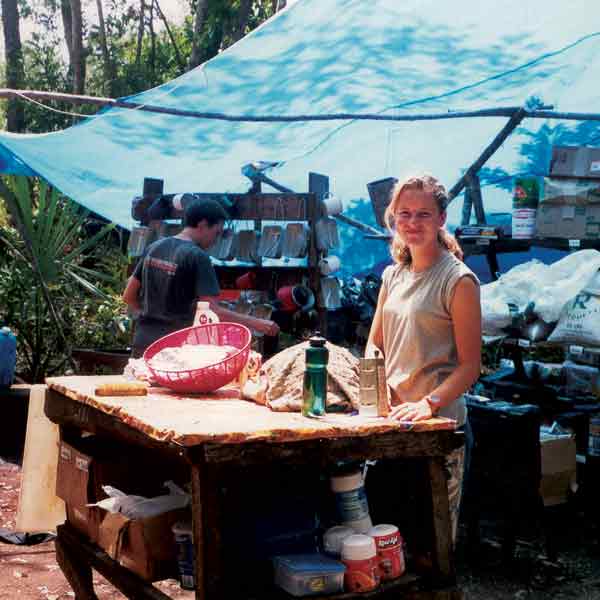If you think you're just paying for the privilege of working for nothing, think again.
Paying to volunteer can seem a strange concept to the uninitiated. Why should someone charge you to work for free? But this is a common misconception about volunteer travel—the volunteer work is not what you are paying for.
If, like thousands of others around the world this year, you decide to do supported volunteer work overseas, you are probably hoping use your time to make a difference on a project that could use your help.
Chances are, the overseas organization you will be working with has precious few resources, and is not in a position to cover the costs of hosting you. Costs such as feeding, housing and transporting a volunteer can add up quickly—and, if such funds were available, they could likely be better used to create employment for local workers, who have relevant language skills who are more likely to stay with the project long-term.
So where does your money go? It often pays for the cost of your housing, food and transport, as well as your training, preparation and supervision. It also goes toward the identification of worthy projects and host organizations, as well as the costs of recruiting you and other volunteers.
If all goes to plan, you may see very little of some other important services that you paid for. Confused? It gets better. This doesn't necessarily mean you didn't get your money's worth. Because one of your biggest investments when paying to volunteer is in your peace of mind—having someone there in case of emergency. A local election raises political tension in the area; an earthquake disrupts the transport system; or you simply fall ill the moment you arrive. These are all things you are better off dealing with when an organization is behind you.
For a company to set up this kind of infrastructure around the world takes a lot of time and money. So at the end of the day, it is fair that they charge for the service.
Not to say that paying to volunteer is for everyone. You might already have the contacts to get worthwhile volunteer work overseas, or simply enough time on your hands to make them as you go. Or perhaps you are just too damn independent to have someone looking out for you all the time.
But for first-timers, people without time, people who want to gain experience in a particular field, or those who want to be part of a community when they travel, supported volunteer work can be just the ticket. Some even say it is life-changing. But that bit is probably down to you.
What everyone gains is an edge for the workplace. Volunteering overseas can be the bridge between your education and a career—even if you volunteer in a completely different field. Because the great thing is, you don't need specific skills to join a project but you can be sure you'll be leaving with some.
Wherever you go, the most important thing is to choose an organization with a sound infrastructure to provide for you before, during and after your placement. Here are some tips on what to look out for.
Staff
It's vital the organization you travel with has a good team both at home and abroad. Find out if their staff have volunteered abroad themselves. If it's a good company, they probably will have. And also ask about their overseas teams. Are they full time members of staff? Will they meet you at the airport? And will they be on hand throughout your placement?
Projects
Paying to volunteer also means knowing you have a project to go to. Your organization should therefore be checking regularly with their projects to ensure they are still functional and, equally vital, in need of volunteers. You might also ask them how the projects were chosen. What makes the project you want to join particularly worthwhile?
Training
Find out what kind of training you will get beforehand. Some projects may not require specific training, but a responsible company should still be doing everything it can to prepare you for your experience overseas. If you are staying with a local family, this may include cultural and language lessons.
Safety Net
This is the biggest difference between paying to volunteer and going it alone. And to make sure you are getting your money's worth, find out well how prepared the organization is for an emergency. Find out what procedures they have in place and even whether they have had experience of emergencies before (this can actually be a good thing). Dig into your insurance policy too. Does it cover things like repatriation and natural disasters?
Cost
Prices and packages vary enormously, so do your research and always have in mind what you want to get out of the experience. For a few hundreds dollars, you might get the contacts and someone to call if you get stuck; while a few thousand dollars will get you a fully supported placement in the country and field of your choice. Many larger organizations provide advice on fund-raising towards your costs.
The Project
Perhaps the greatest benefit of paying to volunteer, however, is seen by the projects themselves. Most organizations have large numbers of volunteers joining their placements all-year-round, so their partner projects are always moving forward.
There's nothing worse than a well-meaning volunteer leaving a project without anyone to take up their good work. With a consistent supply of volunteers, projects can stop scratching the surface and start planning for the future.
Okay, so you might not have the satisfaction of having organized the whole thing yourself, but you will be part of something that lasts. And if you can afford it, isn't that worth paying for?
